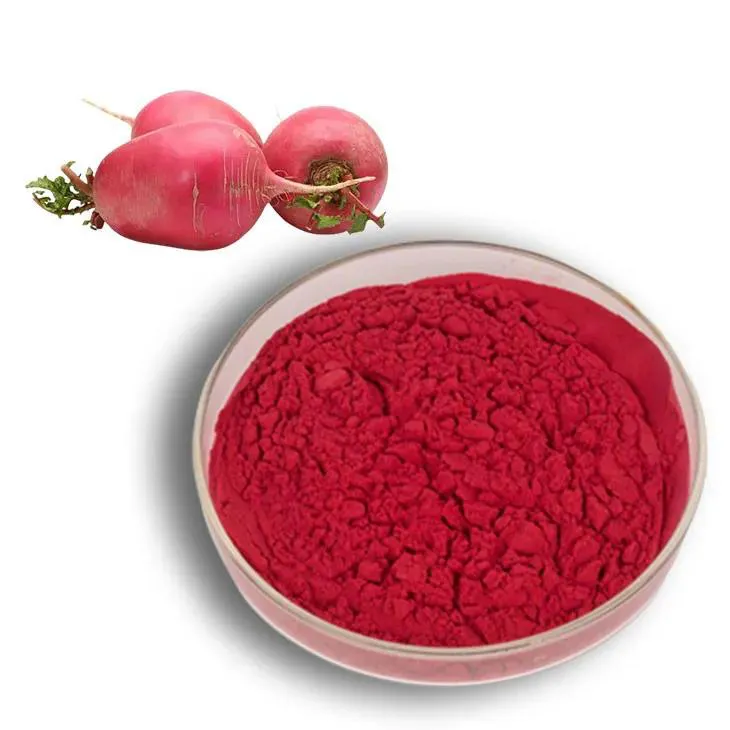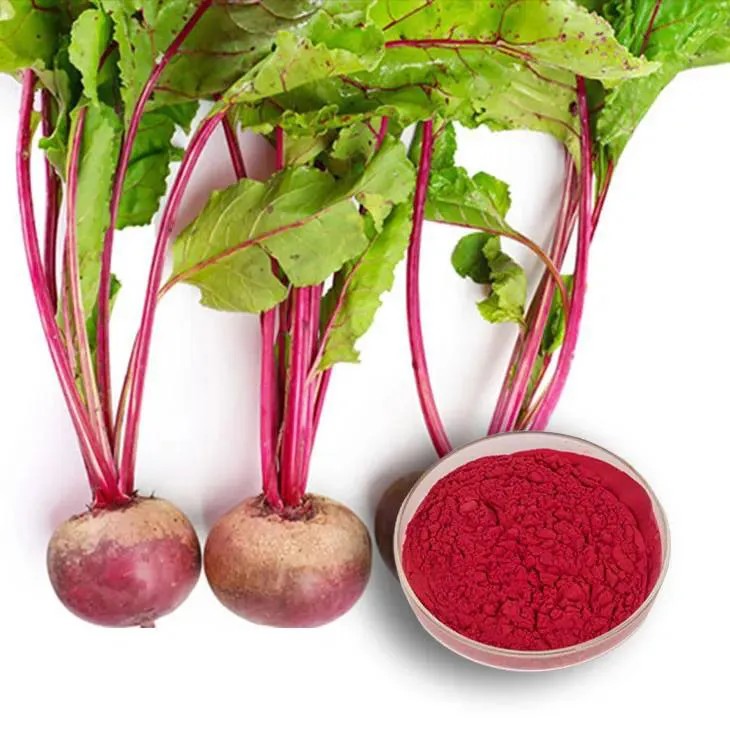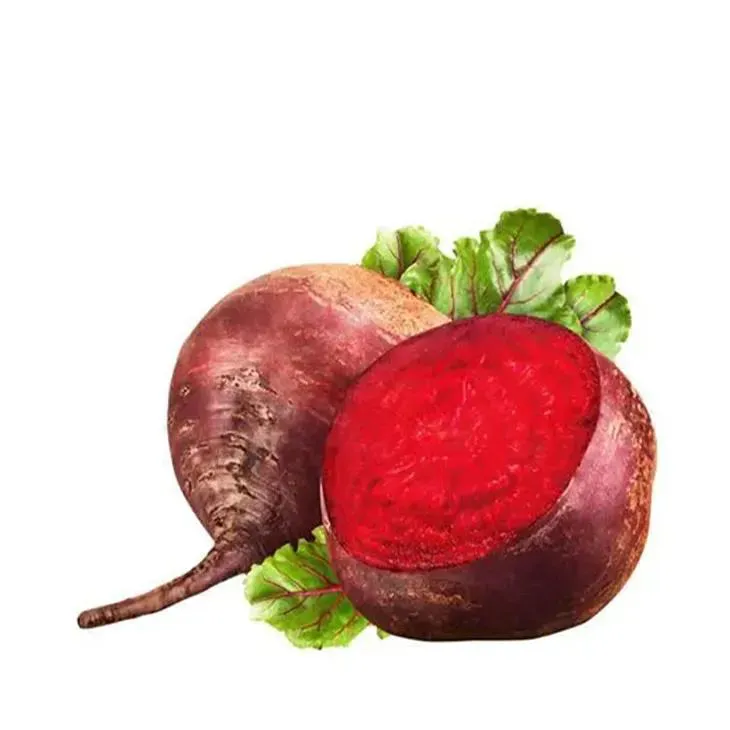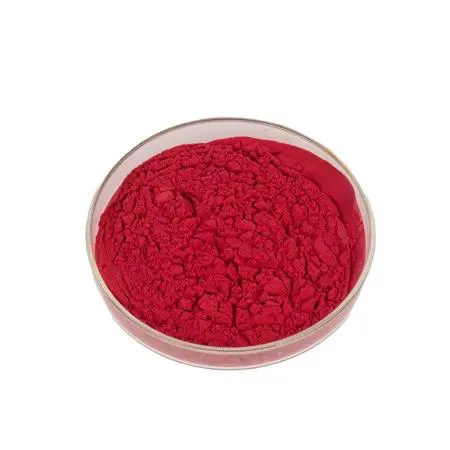- 0086-571-85302990
- sales@greenskybio.com
The Versatile Beet: Incorporating Beet Root Powder and Beetroot Juice Powder in Your Cooking and Baking
2024-08-12

Introduction
The beet, with its vibrant color and earthy flavor, is a vegetable that has been cherished in various cuisines around the world for centuries. In recent years, beet root powder and Beetroot juice Powder have emerged as convenient and versatile alternatives to using fresh beets in cooking and baking. These powders not only offer the unique taste and color of beets but also come with a host of health benefits. In this article, we will explore the many ways in which these powders can be incorporated into your culinary creations.

What are Beet Root Powder and Beetroot juice Powder?
Beet root powder is made by dehydrating beets and then grinding them into a fine powder. It retains most of the nutrients present in fresh beets, such as vitamins, minerals, and antioxidants. Beetroot juice Powder, on the other hand, is created by drying beetroot juice. This powder has a more concentrated flavor compared to the root powder and can add a burst of beet - like taste to dishes.

Health Benefits
Nutritional Value
Both beet root powder and beetroot juice powder are rich in essential nutrients. They are a great source of vitamin C, which is important for a healthy immune system. Additionally, they contain potassium, which helps in maintaining proper heart function and regulating blood pressure.
Antioxidant Properties
Beets are known for their high antioxidant content, and these powders are no exception. The antioxidants in them, such as betalains, help in fighting free radicals in the body. Free radicals can cause damage to cells and are associated with various diseases, including cancer and heart disease. By consuming beet - related powders, you can boost your body's antioxidant defenses.
Improved Athletic Performance
Beetroot powder and juice powder have been shown to improve athletic performance. The nitrates present in beets are converted into nitric oxide in the body, which helps in dilating blood vessels. This, in turn, improves blood flow and oxygen delivery to muscles, allowing athletes to perform better during exercise.

Cooking with Beet Root Powder
Soups and Stews
Adding a spoonful of beet root powder to your soups and stews can transform their color and flavor. For example, in a classic beef stew, a small amount of beet root powder can add a rich, red - hued tint and a subtle earthy note. It pairs well with the hearty flavors of beef, potatoes, and carrots.
- Start by preparing your stew as usual, with the meat, vegetables, and broth.
- Before serving, stir in about 1 - 2 teaspoons of beet root powder per serving, depending on the desired color intensity.
Marinades
Beet root powder can be used to create unique and colorful marinades. It works especially well with poultry and fish.
- For a chicken marinade, mix together beet root powder, olive oil, lemon juice, garlic, and your choice of herbs and spices.
- Let the chicken soak in the marinade for at least 30 minutes before cooking. The beet root powder will not only add color but also a distinct flavor.
Salad Dressings
Incorporating beet root powder into salad dressings can give your salads an unexpected pop of color and flavor.
- To make a simple beet - inspired dressing, blend together beet root powder, vinegar (such as balsamic or apple cider vinegar), olive oil, honey, and a touch of mustard.
- Drizzle this dressing over a bed of fresh greens, along with some sliced beets, goat cheese, and nuts for a delicious and nutritious salad.

Baking with Beet Root Powder
Cakes and Muffins
Beet root powder can be used as a natural food coloring and flavor enhancer in baking. In a red velvet cake, for example, it can replace the artificial red food coloring and add a more natural beet flavor.
- When making a cake or muffin batter, substitute a portion of the flour with beet root powder. Start with a small amount, like 1 - 2 tablespoons per cup of flour, and adjust according to your taste.
- You may need to add a little extra liquid to the batter as the powder can absorb some moisture.
Bread
Adding beet root powder to bread dough can create a beautiful, rosy - hued loaf. It also imparts a slightly sweet and earthy flavor.
- For a basic bread recipe, mix in 2 - 3 tablespoons of beet root powder with the flour.
- Knead the dough as usual and let it rise before baking.
Cookies
Beet root powder can be used to make unique and colorful cookies. It can add a touch of sweetness and a distinct flavor.
- When making cookie dough, add 1 - 2 teaspoons of beet root powder per batch.
- Roll out the dough and cut into your desired shapes before baking.
Cooking with Beetroot Juice Powder
Smoothies
Beetroot juice powder is a great addition to smoothies. It can add a concentrated beet flavor and a boost of nutrition.
- For a simple beet - based smoothie, blend together beetroot juice powder, frozen berries, banana, yogurt, and a liquid such as almond milk or water.
- The powder can be adjusted according to your taste preferences, starting with 1 - 2 teaspoons per smoothie.
Iced Teas
Creating a refreshing iced tea with beetroot juice powder is easy.
- Steep your favorite tea bags (such as black or green tea) in hot water. Let it cool.
- Add beetroot juice powder to the cooled tea, along with some sweetener like honey or agave nectar, and ice cubes.
Dessert Sauces
Beetroot juice powder can be used to make delicious and colorful dessert sauces.
- To make a beet - flavored sauce, combine beetroot juice powder with a small amount of water, sugar, and a touch of cornstarch to thicken.
- This sauce can be drizzled over ice cream, pancakes, or cakes.
Baking with Beetroot Juice Powder
Cupcakes
Using beetroot juice powder in cupcakes can give them a vibrant color and a unique flavor.
- When making the cupcake batter, add 1 - 2 teaspoons of beetroot juice powder per cupcake.
- Frost the cupcakes with your favorite frosting for a delicious treat.
Pies
Incorporating beetroot juice powder into pie fillings can create a visually appealing and flavorful pie.
- For a fruit - based pie, add a small amount of beetroot juice powder to the fruit filling mixture.
- Prepare the pie crust as usual and bake with the filled pie.
Brownies
Beetroot juice powder can be used to add a touch of color and flavor to brownies.
- When making brownie batter, add 1 - 2 teaspoons of beetroot juice powder.
- Bake the brownies as per the recipe instructions.
Conclusion
Beet root powder and beetroot juice powder are truly versatile ingredients that can add a touch of color, flavor, and nutrition to a wide variety of cooking and baking creations. Whether you are looking to enhance the visual appeal of your dishes, add a unique taste, or boost their health benefits, these powders are excellent choices. Experiment with different recipes and amounts to find the perfect way to incorporate them into your culinary repertoire.
FAQ:
What are the main health benefits of beet root powder and beetroot juice powder?
Beet root powder and beetroot juice powder are rich in nutrients. They are a good source of nitrates, which can help improve blood flow and lower blood pressure. They also contain antioxidants like betalains that can fight oxidative stress in the body, potentially reducing the risk of chronic diseases. Additionally, they are rich in vitamins such as vitamin C, fiber, and minerals like potassium.
How can beet root powder be used in cooking?
Beet root powder can be used in various ways in cooking. It can be added to soups and stews to give a rich color and a slightly earthy flavor. It can be used as a natural food coloring in things like homemade pasta or sauces. You can also mix it into marinades for meats to add both color and a unique flavor. For example, when making a beef stew, adding a spoonful of beet root powder can enhance the overall appearance and add a subtle depth to the flavor.
What about using beetroot juice powder in baking?
Beetroot juice powder is great for baking. It can be added to cake or muffin batters to give a beautiful pink or purple hue. It also imparts a slightly sweet and earthy flavor. For instance, in a vanilla cupcake recipe, replacing a small amount of the flour with beetroot juice powder can create a visually appealing and delicious treat. It can also be used in making bread, adding a touch of color and a different flavor dimension.
Can beet root powder and beetroot juice powder be used interchangeably?
While they share some similarities, they are not completely interchangeable. Beet root powder has a more concentrated form and may have a stronger earthy flavor compared to beetroot juice powder. Beetroot juice powder may add more moisture to a recipe due to its origin from juice. In cooking, if a recipe calls for a more intense color and flavor, beet root powder might be a better choice. However, in baking where a lighter touch of flavor and color is desired, beetroot juice powder could be more suitable.
How much beet root powder or beetroot juice powder should be added to a recipe?
The amount to add depends on the recipe and personal preference. In general, start with a small amount, like half a teaspoon for beet root powder in a regular - sized soup or a quarter teaspoon of beetroot juice powder in a cupcake batter. You can gradually increase the amount until you achieve the desired color and flavor. Too much beet root powder can overpower the other flavors in a dish, and too much beetroot juice powder can make a baked good too moist or change the texture significantly.
Related literature
- The Nutritional Value of Beets and Their Derivatives"
- "Beet Root Powder in Culinary Applications: A Comprehensive Guide"
- "Beetroot Juice Powder: Health Benefits and Usage in the Kitchen"
- ▶ Hesperidin
- ▶ citrus bioflavonoids
- ▶ plant extract
- ▶ lycopene
- ▶ Diosmin
- ▶ Grape seed extract
- ▶ Sea buckthorn Juice Powder
- ▶ Beetroot powder
- ▶ Hops Extract
- ▶ Artichoke Extract
- ▶ Reishi mushroom extract
- ▶ Astaxanthin
- ▶ Green Tea Extract
- ▶ Curcumin Extract
- ▶ Horse Chestnut Extract
- ▶ Other Problems
- ▶ Boswellia Serrata Extract
- ▶ Resveratrol Extract
- ▶ Marigold Extract
- ▶ Grape Leaf Extract
- ▶ blog3
- ▶ blog4
-
Kidney Bean Extract
2024-08-12
-
Rose Hip Extract
2024-08-12
-
Polygonum Cuspidatum Extract
2024-08-12
-
Oat Straw Extract Powder
2024-08-12
-
Ginger Extract
2024-08-12
-
Fig Extract
2024-08-12
-
Resveratrol extract
2024-08-12
-
Passionflower Extract
2024-08-12
-
Withania Somnifera Extract
2024-08-12
-
Lemon Juice Powder
2024-08-12





















